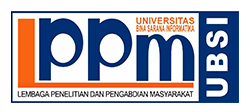Government Securitizing Effort of Online Harmful Content in Indonesia
Abstract
The emergence of the Internet and social media has altered the
way individuals interact with each other.This has also led to the flourishment
of many user generated contents in many platforms, where platforms act as
the medium or environment for users’ posts and interactions. While these
development may contribute to bring space for ensuring citizens’ freedom of
speech and expression, there also cases where the very same environment
is filled with ‘harmful’ contents such as fake news, hate speech, online fraud,
etc. The government along with other related stakeholders in the field have
the responsibility to ensure such harmful contents do not manifests into
offline harms. In handling these issues, the government have often utilize
legal measures to apply sanctions for the platforms and or individual creators
and restrict the spread of the contents. Using the securitization perspective,
this study will look into Indonesian government current approach in tackling
the online harmful content. This study argue that the government has put the
issue into a higher level, putting it into the national security agenda, in which
resulting in some extraordinary measure being applied in several instances.
Nonetheless, this study suggests that it is of importance for the government
and all related stakeholders to de-securitize the issue, putting it into the
everyday discussion and politics, while ensuring the protection of citizens’
rights.
Full Text:
PDFReferences
Adam Bermingham, et.al., “Combining Social Network Analysis and Sentiment Analysis to Explore the Potential for Online Radicalisation”, Conference Proceeding in 2009 International Conference on Advances in Social Network Analysis and Mining, p.2.
Anugrahadi, A., (2019, August 15), Polri Luncurkan Patrolisiber.id, untuk Mudahkan Masyarakat Lapor Kejahatan Siber [daring], Liputan6.com, https://www.liputan6.com/news/read/4038070/polri-luncurkan- patrolisiberid-untuk-mudahkan-masyarakat-lapor-kejahatan-siber.
APJII. 2019. Laporan Survei Penetrasi dan Profil Perilaku Pengguna Internet Indonesia 2018.
Buzan, B. (1991). People, States and Fear, An Agenda for International Security Studies in The Post-Cold War Era, (2nd ed), Colorado, Lynne Rienner Publishers.
Buzan, B. H. (2009). The Evolution of International Security. Cambridge: Cambridge University Press.
Buzan, Bary, Waever, Ole, de Wilde, Jaap, (1998). Security: A New Framework of Analysis, Lynne Rienner, London.
Charlie Campbell, “ISIS Unveiled: The Story Behind Indonesia’s First Female Suicide Bomber”, TIME, 3 March 2017, viewed 10 August 2017, < http://time.com/4689714/indonesia-isis-terrorism-jihad-extremism-dian-yulia-novi-fpi/>
Conway, Maura, ‘Terrorist “Use” of the Internet and Fighting Back’, Oxford Internet Institute, paper presented on the Conference Cybersafety: Safety and Security in a Networked World: Balancing Cyber-Rights and Responsibilities, 8-10 September 2005, pp. 1-34.
Eka, R. (2018). Hoax Distribution through Digital Platforms in Indonesia 2018 [online] DailySocialID. https://dailysocial.id/post/laporan-dailysocial-distribusi-hoax-di-media-sosial-2018.
GATRA, (2019, June 19), Kepolisian Jelaskan Tahapan Patroli Siber [online]. GATRA.
https://www.gatra.com/detail/news/422851/politik/kepolisian-jelaskan-tahapan-patroli-siber.
Gil de Zúñiga, H., Jung, N., & Valenzuela, S. (2012). Social media use for news and individuals' social capital, civic engagement and political participation. Journal of computer-mediated communication, 17(3), 319-336.
Haryanto, A., 2018, Menkominfo Ungkap Alasan Twitter dkk Tak Diblokir Seperti Tumblr [online], Detik.com, https://inet.detik.com/law-and-policy/d-3905290/menkominfo-ungkap-alasan-twitter-dkk-tak-diblokir-seperti-tumblr
Hirschauer, S. (2014). The securitization of rape: Women, war and sexual violence. Springer.
Hootsuite. 2019. Global Digital Report 2019. Diakses dari https://wearesocial.com/global-digital-report-2019.
Jee, C., 2020, Facebook needs 30,000 of its own content moderators, says a new report, https://www.technologyreview.com/2020/06/08/1002894/facebook-needs-30000-of-its-own-content-moderators-says-a-new-report/
Juniarto, Damar., 2021. Penindasan Teknologikal (Technological Repression) terhadap Aktivisme Digital di Indonesia. [online]
KOMPASTV, 2021. Eksklusif, Masuk ke Dapur Polisi Virtual - AIMAN. [video] Available at: https://www.youtube.com/watch?v=l1NeJ2jasQs
Linke, A. & Zerfass, A. 2013. Social Media Governance: regulatory frameworks for successful online communication. Journal of Communication Management. Vol 17. No 3. pp. 270-286. DOI. 10.1108/JCOM-09-2011-0050.
Reuter institute for the Study of Journalism. 2017. Digital News Report 2017 [ebook]. Reuters Institute. https://reutersinstitute.politics.ox.ac.uk/sites/default/files/Digital%20News%20Report%202017%20web_0. pdf, 11.
Shao, Chengcheng, Ciampaglia, Giovanni, Flammini, Alessandro, & Menczer, Filippo 2016, Hoaxy: A Platform for Tracking Online Misinformation, Proceeding at the International World Wide Web Conference WWW’16 Companion, http://www2016.net/proceedings/companion/p745.pdf
Tehusijarana, K.M. & Valentina, J., 2019. Jakarta riot: Government temporarily limits access to social media, messaging apps, https://www.thejakartapost.com/life/2019/05/22/jakarta-riot-government-temporarily-limits-access-to-social-media-messaging-apps.html.
DOI: https://doi.org/10.31294/jkom.v14i2.15575
| Index by: | ||








|
||
| E-ISSN: 2579-3292 | ||

 https://road.issn.org/sites/all/themes/customroad/img/road-issn.png
https://road.issn.org/sites/all/themes/customroad/img/road-issn.png
|
||
Dipublikasikan oleh LPPM Universitas Bina Sarana InformatikaJl. Kramat Raya No.98, Kwitang, Kec. Senen, Kota Jakarta Pusat, DKI Jakarta 10450
|








